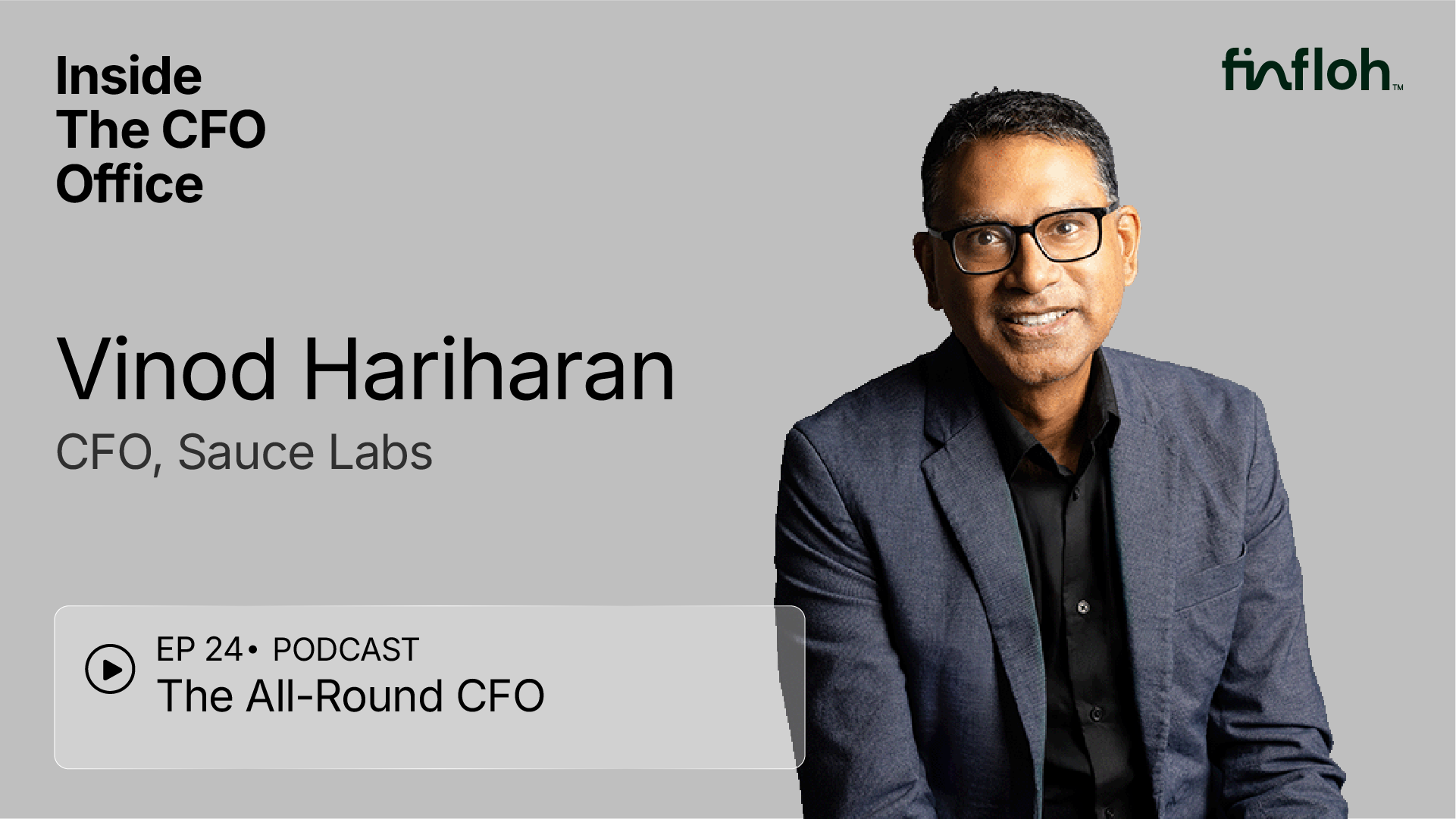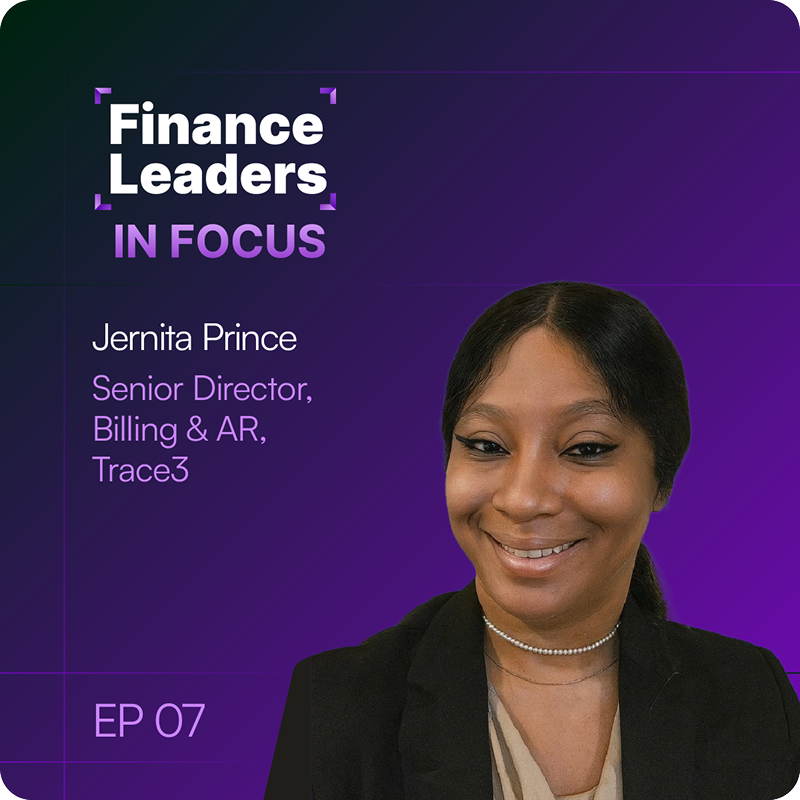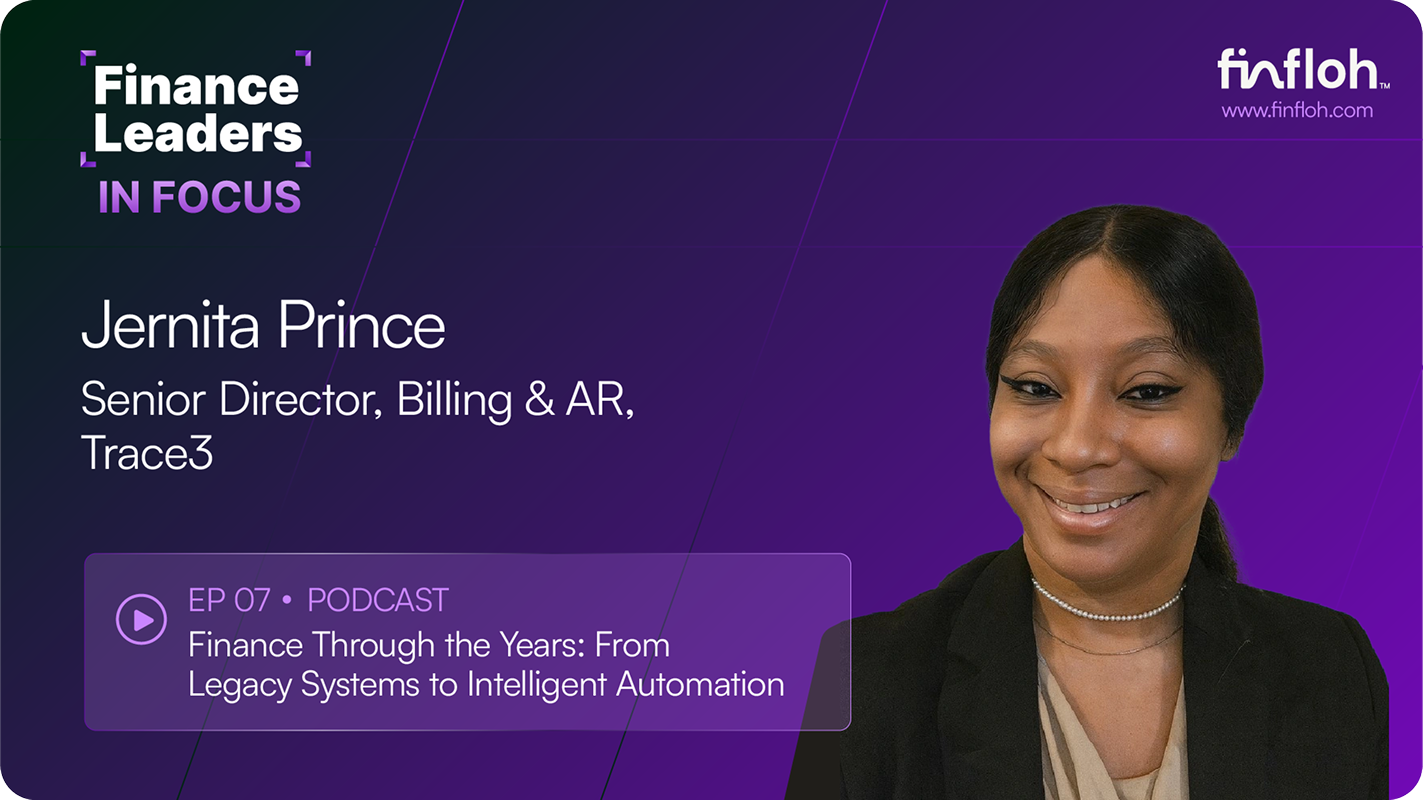Evolving role of CFOs in FinTech firms
Chapters
Key Takeaways
- CFOs act as strategic advisors to the CEO, balancing growth, risk, and sustainability
- Startups thrive on agility, while enterprises focus on stability and scale
- AI is transforming finance, but its full potential is yet to be realized
- Multiple paths lead to CFO roles, but strategic and financial expertise is key
- ERPs must evolve from reporting tools to intelligent, predictive systems
Speakers

Guest Speaker
Subodh Karnad
Finance Leader, Common, Travelex, Nokia, Paypal

Hosted By
Amartya Singh
CEO & Cofounder, FinFloh
Episode Transcript
Amartya: Hello everyone! I'm your host, Amartya Singh, Co-founder and CEO of FinFloh, a product built by and for modern finance teams. Welcome to the tenth episode of Inside the CFO Office, the podcast where we uncover the journeys of finance leaders, explore their challenges, and discuss the future of financial leadership.
Today, we're diving into the evolving role of CFOs in FinTech firms, and I'm thrilled to have Subodh Karnad with us. Subodh has extensive experience as a CFO across high-growth fintech startups and Fortune 200 firms, including Common, Travelex, Nokia, PayPal, Visa, and Wells Fargo. He's known for driving financial discipline, building high-performing teams, and serving as a trusted advisor to CEOs.
Today, we’re diving into the evolving role of CFOs in FinTech firms, and I’m thrilled to have Subodh Karnad with us. Subodh has extensive experience as a CFO across high-growth fintech startups and Fortune 200 firms, including Common, Travelex, Nokia, PayPal, Visa, and Wells Fargo. He’s known for driving financial discipline, building high-performing teams, and serving as a trusted advisor to CEOs.
Subodh has led finance teams across fintech, payments, e-commerce, and marketplaces, bringing a unique blend of strategic foresight and execution expertise. I’ve had some great conversations with him on the role of finance leaders in today’s rapidly changing world. In this episode, we’ll explore his journey from finance manager to CFO, the key differences between startups and enterprises, and how AI and predictive intelligence are reshaping financial leadership.
So let’s dive in. Welcome, Subodh! Happy to have you with us.
Amartya: Let's start with your career journey. You've moved through multiple finance leadership roles, from Fortune 200 firms to high-growth startups. What have been the biggest turning points in your career?
Amartya: Let’s start with your career journey. You’ve moved through multiple finance leadership roles, from Fortune 200 firms to high-growth startups. What have been the biggest turning points in your career?
Subodh: It’s been a fascinating journey. Over the last 20 years, I’ve worked across companies of all sizes, spanning different growth stages, industries, and economic cycles. I’ve had the opportunity to work with exceptional leaders, manage world-class teams, and navigate global financial challenges.
But beyond crises, my most valuable learnings came from building finance teams, driving business transformation, and ensuring that finance is not just about reporting numbers—it's about enabling growth.
But beyond crises, my most valuable learnings came from building finance teams, driving business transformation, and ensuring that finance is not just about reporting numbers—it’s about enabling growth.
Amartya: That’s a fantastic perspective. Leading through uncertainty is a key skill for modern CFOs. Let’s talk about your experience at Common—your first CFO role at a venture-backed fintech startup. What were the biggest challenges you faced, and how did they shape your leadership approach?
The second challenge was fundraising in a shifting market. We had strong backing from our existing investors, but attracting new capital in a changing macro environment was tough. By late 2022, as interest rates climbed and venture funding dried up, we had to rethink our financial strategy. The lesson? A great CFO must be proactive—predicting when funding windows will close and ensuring the company is well-prepared.
Amartya: Absolutely! I can relate to that challenge—balancing VC expectations, growth trajectories, and capital strategy is never easy. Now, you've worked in both startups and large enterprises. What are the biggest differences in financial leadership between the two?
Amartya: Absolutely! I can relate to that challenge—balancing VC expectations, growth trajectories, and capital strategy is never easy. Now, you’ve worked in both startups and large enterprises. What are the biggest differences in financial leadership between the two?
1️⃣ Risk & Stability - Large corporations focus on stability, risk management, and long-term resilience, while startups thrive on agility, execution speed, and rapid scaling. Large companies weather crises better, while startups often face existential threats if capital runs dry.
2️⃣ Thinking vs. Doing - Enterprises have multiple layers of planning, strategic reviews, and incremental decision-making. Startups, on the other hand, operate in execution mode—testing, iterating, and scaling quickly.
3️⃣ Resources - Large firms have deep resources, established teams, and external consultants. In startups, finance leaders must wear multiple hats, get hands-on, and solve problems with limited resources.
Despite these differences, the core principles of finance leadership remain the same—driving value, managing risk, and ensuring financial discipline.
Amartya: That's a great breakdown. Now, let's talk about the future—specifically, financial technology. Are today's ERP systems meeting the needs of modern finance teams, or is there room for innovation?
Amartya: That’s a great breakdown. Now, let’s talk about the future—specifically, financial technology. Are today’s ERP systems meeting the needs of modern finance teams, or is there room for innovation?
Subodh: ERPs have come a long way, but they haven’t evolved beyond data collection and reporting. While systems like SAP, Oracle, and NetSuite do a good job at managing financial workflows, they lack automation, intelligence, and predictive capabilities.
Amartya: Completely agree! Predictive intelligence is the missing piece in finance tech today. That brings us to AI. How do you see AI transforming finance?
Subodh: AI will reshape financial processes across the board:
FP&A & Forecasting – AI can analyze historical trends, macroeconomic indicators, and market data to predict financial outcomes with greater accuracy.
Credit Risk & Compliance – AI models can assess creditworthiness, detect anomalies, and flag potential compliance risks in real-time.
Pricing Models – AI can dynamically adjust pricing strategies based on market conditions, demand patterns, and competitor data.
We're still early in AI's adoption, but as AI models become more sophisticated, finance teams will move from reporting numbers to shaping strategy.
We’re still early in AI’s adoption, but as AI models become more sophisticated, finance teams will move from reporting numbers to shaping strategy.
Amartya: That’s an exciting vision. Before we wrap up, what advice would you give to finance professionals looking to advance their careers?
1️⃣ Master the Fundamentals – You need to know your numbers inside out. Technical expertise is non-negotiable.
2️⃣ Be Business-Savvy – Understand how finance connects to operations, sales, and strategy. Finance doesn't exist in a vacuum.
3️⃣ Develop Leadership & Storytelling Skills – Finance leaders must translate numbers into compelling narratives for CEOs, investors, and stakeholders.
2️⃣ Be Business-Savvy – Understand how finance connects to operations, sales, and strategy. Finance doesn’t exist in a vacuum.
Amartya: That's great advice! Subodh, it's been a pleasure having you on the podcast. Thanks for sharing your journey and insights!
Amartya: That’s great advice! Subodh, it’s been a pleasure having you on the podcast. Thanks for sharing your journey and insights!
Subodh: Thanks, Amartya! I’ve enjoyed this conversation and hope it’s valuable for the listeners.
Latest Episodes






Explore the Full Potential of FinFloh
Supercharge Your Receivables Performance